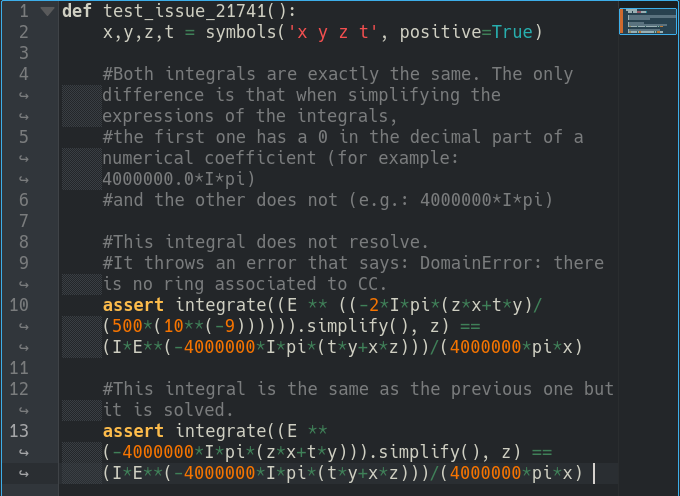New issue
Have a question about this project? Sign up for a free GitHub account to open an issue and contact its maintainers and the community.
By clicking “Sign up for GitHub”, you agree to our terms of service and privacy statement. We’ll occasionally send you account related emails.
Already on GitHub? Sign in to your account
integrate() does not work with multivariable function that is solved by simple substitution. DomainError: there is no ring associated with CC #21741
Comments
|
@oscarbenjamin Hi , I'm kinda new to open source contribution and would like to work on fixing this issue , can i be assigned this issue? |
|
Issues are not assigned to anyone. I have marked it as easy to fix in order to invite someone to contribute a PR that fixes this so go ahead. There is a guide to the workflow here: |
|
@oscarbenjamin Hey , I'm kinda struck on how to write the test case for this issue , could you please give a headstart on how to write? |
|
@praneethratna I think what Oscar is saying is that you need to add in the integral test method stack (sympy/integrals/tests/test_integrals.py), the two forms of the integral that I mention here with the correct solutions, using the assert function to throw exceptions in case the condition is not met due to problems with the integration algorithm. |
|
@oscarbenjamin The error has not yet been resolved. I added the two integrals to the test_integrals.py file following the examples in that file. On the other hand, when running:
The test fails as shown in the image. I use the most recent version (from 2 hours ago) from the sympy repository on Github. What else do you recommend doing? |
|
Not sure what the problem is but try running that code directly outside of the test suite and see what the output is for both lhs and rhs. Note that |
But the integration method should support the coefficient being of rational or float type, right? |
|
You are right, now it does work and performs the integral without problems (outside the test environment with the latest version of the repository), however the results are not the same even though the expressions to integrate are the same in the mathematical context. I think it has to do with what you mention about the 10**(-9). |
|
@LuisMi1245 i got the same error that you got while adding the test case , well as also mentioned this seems to be a problem with 10**(-9) being a float but how can that be fixed? |
def test_issue_21741():
x,y,z,t = symbols('x y z t', positive=True)
#Both integrals are exactly the same.
assert integrate(E ** ((-2*I*pi*(z*x+t*y))/((500*(Rational(1,10**9))))), z).simplify() - (I*E**(-4000000*I*pi*(t*y+x*z)))/(4000000*pi*x).simplify() == 0
assert integrate((E ** (-4000000*I*pi*(z*x+t*y))), z).simplify() - (I*E**(-4000000*I*pi*(t*y+x*z)))/(4000000*pi*x).simplify() == 0You just need to understand that 10**-9 is a division that will first be captured and evaluated by python as a floating point expression. In that case, you must indicate that the expression is of type sympy using simpify() or Rational(1,10**9) so that it retains the fraction. You can find this at: |
|
The floating point numbers need to match exactly for the test to succeed: In [45]: a = Float('3999999.9999999995', precision=53)
In [46]: b = Float('2.5000000000000004e-7', precision=53)
In [47]: r = Piecewise((b*I*exp(-a*I*pi*t*y)*exp(-a*I*pi*x*z)/(pi*x), Ne(1.0*pi*x*exp(a*I*pi*t*y), 0)), (z*exp(-a*I*pi*t*y), True))
In [48]: integrate(fun, z) == r
Out[48]: TrueYou can see the internal representation of the expressions in full detail using In [49]: srepr(integrate(fun, z))
Out[49]: "Piecewise(ExprCondPair(Mul(Float('2.5000000000000004e-7', precision=53), I, Pow(pi, Integer(-1)), Pow(Symbol('x'), Integer(-1)), exp(Mul(Integer(-1), Float('3999999.9999999995', precision=53), I, pi, Symbol('t'), Symbol('y'))), exp(Mul(Integer(-1), Float('3999999.9999999995', precision=53), I, pi, Symbol('x'), Symbol('z')))), Unequality(Mul(Float('1.0', precision=53), pi, Symbol('x'), exp(Mul(Float('3999999.9999999995', precision=53), I, pi, Symbol('t'), Symbol('y')))), Integer(0))), ExprCondPair(Mul(Symbol('z'), exp(Mul(Integer(-1), Float('3999999.9999999995', precision=53), I, pi, Symbol('t'), Symbol('y')))), true))"There should probably be a helper function for tests that can check whether two expressions are almost equal wrt floating point numbers. |
>>> a = Float(4*10**6)
>>> b = Float(2.5e-7)
>>> r = Piecewise((b*I*exp(-a*I*pi*t*y)*exp(-a*I*pi*x*z)/(pi*x), Ne(1.0*pi*x*exp
(a*I*pi*t*y), 0)), (z*exp(-a*I*pi*t*y), True))
>>> ans = integrate(fun,z)
>>> r==ans
False
>>> str(r)==str(ans)
True
>>> dif = ans - r
>>> dif.xreplace({i:Float(str(i)) for i in dif.atoms(Float)})
0 |
Yes, I gave up trying a PR due to ignorance. I am glad I understood. |



>> x, y, z, t = symbols('x y z t')>> fun = E ** ( (-2*I*pi* (z*x+t*y) / (500*(10**(-9))) ) )returns the following:
Now I try to integrate with respect to z:
>> integrate(fun, z)And the output is an error raised by the get_ring() method of the Domain class (I think) that says:
DomainError: there is no ring associated with CC
However, if I rewrite the function obtained by python fun, but in this case, removing the decimal point and the leftover zero in a new sympy variable fun2, then the integral solves beautifully. I mean this:
>> fun2 = E**( -4000000*I*pi*(t*y+x*z) )>> integrate(fun2,z)returns the following:
And this is correct. Anyway, I had to spend hours trying to understand the reason for the error, although I honestly don't know the reason. I can only conclude that the integration system might have some internal bug.
The text was updated successfully, but these errors were encountered: